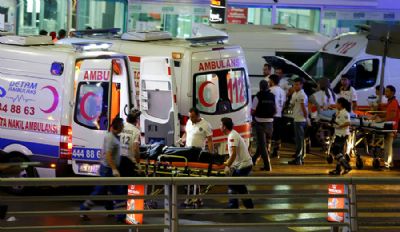At least 28 people were killed and dozens more were injured when three suicide bombers attacked Istanbul's main international airport Tuesday night, a government official said.
Istanbul's provincial governor, Vasip Sahin, confirmed the death toll from the blasts at Istanbul Ataturk Airport to the private NTV broadcaster. Turkey's state-run Anadolu news agency reported that around 60 people were injured, six of them seriously.
Initial reports indicated that there had been two suicide bombers, at least one of whom attacked the airport's international terminal. Sahin said authorities believed there were three attackers because three explosions had been heard.
"According to the information I was given, a terrorist at the international terminal entrance first opened fire with a Kalashnikov and then blew himself up," Justice Minister Bekir Bozdag told Turkey's state-run news agency earlier in the evening.
NTV reported that one of the explosions occurred at the international terminal while another took place at the domestic terminal. However, that report was not immediately confirmed by Turkish authorities.
A Turkish official told The Washington Post that the bombers blew themselves up after police shot at them. Another official told Reuters that the bombers detonated their explosives prior to passing through a X-ray security checkpoint.
Turkish airports have security checks at the entrance of terminal buildings and then again before entry to departure gates.
Police sealed off the terminal and flights were prevented from taking off or landing. A Turkish airport official confirmed to Reuters that some flights bound for the airport have been diverted, while passengers on scheduled outbound flights were being put up in nearby hotels. NTV reported that all flights would be canceled until at least 8 a.m. local time Wednesday.
Some passengers were kept in the airport for over two hours after the explosions before the terminal was evacuated. Hundreds spilled out on to the sidewalk with suitcases in their hands or stacked on trollies.
Two South African tourists, Paul and Susie Roos from Cape Town, were at the airport and due to fly home at the time of the explosions.
"We came up from the arrivals to the departures, up the escalator when we heard these shots going off," Paul Roos told the Associated Press. "There was this guy going roaming around, he was dressed in black and he had a handgun."
Veysel Allay, who was waiting for a friend in the arrivals terminal, told the Daily Telegraph, "A man ran up and ripped open his jacket, showing a bomb vest. I ran before he did anything."
Mercan Usul, a 16-year-old girl who had just arrived from Dusseldorf to meet her aunt, told the paper, "I was at arrivals and heard an explosion, everybody ran. Everybody panicked."
Roads around the airport were sealed off for regular traffic after the attack and several ambulances could be seen driving back and forth.
The private DHA news agency said the wounded, among them police officers, were being transferred to Bakirkoy State Hospital.
In the U.S., President Obama was briefed about the attack by Lisa Monaco, his homeland security and counterterrorism adviser. At a press conference in Arizona, Attorney General Loretta Lynch said she was "awaiting a briefing" on the attacks, adding "certainly we will be looking into it."
A law enforcement source told Fox News that there were no immediate plans for additional security in so-called "sterile zones", areas where passengers have already gone through checkpoints, at U.S. airports. The official said any decision to add security outside sterile zones would be made by state or local law enforcment.
Ataturk Airport is the largest in Turkey and the third busiest in Europe behind London's Heathrow Airport and Paris' Charles de Gaulle. More than 60 million passengers went through the hub in 2015. It is also one of the fastest-growing airports in the world, seeing 9.2 percent more passengers last year than in 2014.
Turkey has been the target of recent terror attacks by ISIS extremists, as well as Kurdish nationalist groups. Earlier this month, a car bomb targeted a bus carrying riot police in Istanbul, killing 11 people and injuring 36 others.
The attacks have increased in scale and frequency, scaring off tourists and hurting the Turkish economy, which relies heavily on tourism revenues.
June 28, 2016
At Least 28 Dead, 60 Injured in Terror Attack at Istanbul Airport
Date
June 28, 2016
Title
At Least 28 Dead, 60 Injured in Terror Attack at Istanbul Airport,
Fox News
Original Source

